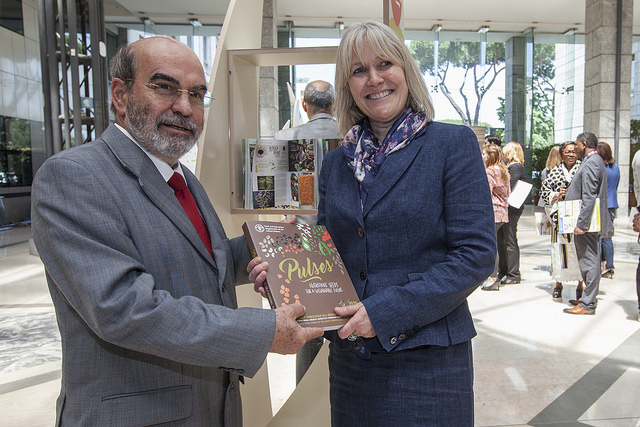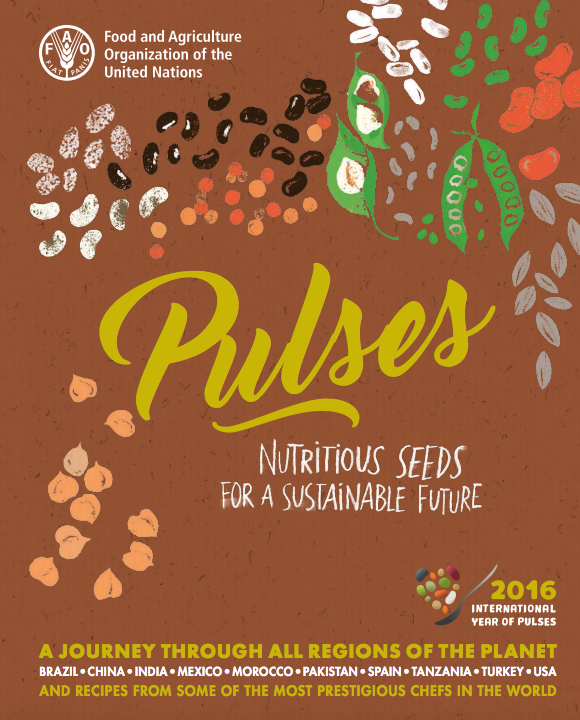A 190-page book, featuring recipes from across the world, has been launched in Rome to celebrate the importance of beans, peas, chickpeas and lentils.
 The Food and Agricultural Organisation of the United Nations (FAO), responsible for officially declaring 2016 the International Year of Pulses, say the book aims to ‘take readers on a journey through kitchens and cultures across the world’.
The Food and Agricultural Organisation of the United Nations (FAO), responsible for officially declaring 2016 the International Year of Pulses, say the book aims to ‘take readers on a journey through kitchens and cultures across the world’.
The book – Pulses: Nutritious Seeds for a Sustainable Future – packed with high-quality graphics and photographs, aims to whet the appetite for pulse dishes by encouraging people from different countries to ‘delve into cooking pots’ to explore the benefits.
Why are pulses so great?
 While small, pulses are packed with proteins – double that found in wheat and three times that in rice. Particularly when they’re consumed with cereals, pulses increase the protein quality of meals.
While small, pulses are packed with proteins – double that found in wheat and three times that in rice. Particularly when they’re consumed with cereals, pulses increase the protein quality of meals.
Pulses are also rich in micronutrients and b-vitamins, and the fact that they’re cheap makes them ideal for improving diets in poorer parts of the world.
But their health benefits don’t stop there. Pulses are also excellent for managing weight, cholesterol and digestive health and for combating anaemia in women and children. And because they do not contain gluten, they are ideal for celiac patients.
Spreading the word around the world
The FAO have also chosen a number of high profile chefs, academics and writers from different regions to become ambassadors and promote the benefits of the versatile superfoods:
Jenny Chandler, FAO special ambassador for the IYP for Europe
A writer and a teacher, Jenny is a regular contributor to a number of food-related blogs (including her own), the Borough Market Magazine, and she has written three cookbooks. Jenny believes that “with pulses there is no sacrifice: they are fabulously delicious to eat as well as being great for health and the planet.” You can read Jenny’s blog post on why she loves pulses on our website.
What Jenny's interview with the FAO here.
Joyce Boye, FAO special ambassador for the IYP for North America
A leading scientist for Agriculture and Agri-Food Canada, Joyce heads a research study on plant protein and food allergies with a particular focus on peas and pulses. In 2001 Joyce won the Research Partnership Prize of Excellence (Agriculture and Agri-Food Canada).
Kadambot Siddique, FAO special ambassador for the IYP for the Asia-Pacific region.
Kadambot, a researcher and leading scientist in the field of legumes, currently serves as professor of agriculture and chair and director of the Institute of Agriculture at the University of Western Australia.
Elizabeth Mpofu, FAO special ambassador for the IYP for Africa
Agro-ecological farmer and activist, Elizabeth has dedicated her life to working tirelessly for the betterment of smallholder farmers and the rights of women. Elizabeth helped establish the Zimbabwe Smallholder Organic Farmers Forum (ZIMSOFF), and helped found the Eastern Southern Smallholder Farmers’ Forum (ESAFF).
Magy Habib, FAO special ambassador for the IYP for the Near East and North Africa
As a food stylist, Magy works on the aesthetics of food. She is also the presenter of a cooking program aimed at developing healthy recipes through her knowledge of local and ethnic foods, and former editor of the Food Section of El-Beit Magazine. Passionate about pulses, Magy is always searching to revive traditional food.
The hardcover book is currently available in English, French, Spanish, and versions in Arabic, Chinese and Russian are in production. It retails at $29.95 through FAO and select distributors (email This email address is being protected from spambots. You need JavaScript enabled to view it. for direct orders and local retail information or find it on Amazon in hard copy and kindle format).
